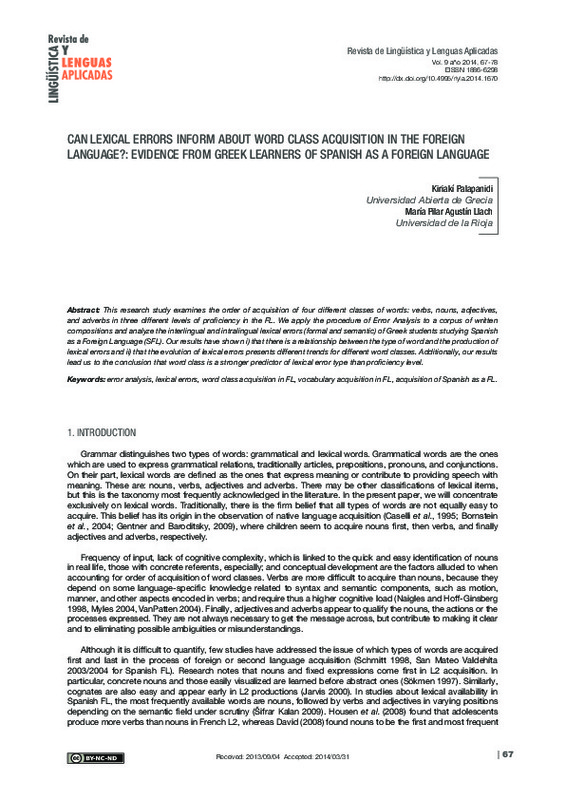JavaScript is disabled for your browser. Some features of this site may not work without it.
Buscar en RiuNet
Listar
Mi cuenta
Estadísticas
Ayuda RiuNet
Admin. UPV
Can lexical errors inform about word class acquisition in FL?: evidence from greek learners of Spanish as a foreign language
Mostrar el registro sencillo del ítem
Ficheros en el ítem
| dc.contributor.author | Palapanidi, Kiriaki
|
es_ES |
| dc.contributor.author | Agustín Llach, María Pilar
|
es_ES |
| dc.date.accessioned | 2014-11-26T10:33:21Z | |
| dc.date.available | 2014-11-26T10:33:21Z | |
| dc.date.issued | 2014-07-01 | |
| dc.identifier.issn | 1886-2438 | |
| dc.identifier.uri | http://hdl.handle.net/10251/44862 | |
| dc.description.abstract | [EN] This research examines the order of acquisition of words of four different classes: verbs, nouns, adjectives, and adverbs in three different levels of proficiency in the FL. We apply the procedure of Error Analysis to a corpus of written compositions and analyze the interlingual and intralingual lexical errors (formal and semantic) of the Greek students of Spanish as a Foreign Language (SFL). Our results have shown us that there is relationship between the type of word and the production of lexical errors and that the lexical errors present different trend in the different word classes. Additionally, our results lead us to the conclusion that the word class as a stronger predictor of lexical error type than proficiency level. | es_ES |
| dc.language | Inglés | es_ES |
| dc.publisher | Editorial Universitat Politècnica de València | |
| dc.relation.ispartof | Revista de Lingüística y Lenguas Aplicadas | |
| dc.rights | Reserva de todos los derechos | es_ES |
| dc.subject | Error analysis | es_ES |
| dc.subject | Lexical errors | es_ES |
| dc.subject | Word class acquisition in FL | es_ES |
| dc.subject | Vocabulary acquisition in FL | es_ES |
| dc.subject | Acquisition of Spanish as a FL | es_ES |
| dc.title | Can lexical errors inform about word class acquisition in FL?: evidence from greek learners of Spanish as a foreign language | es_ES |
| dc.type | Artículo | es_ES |
| dc.date.updated | 2014-11-26T08:32:53Z | |
| dc.identifier.doi | 10.4995/rlyla.2014.1670 | |
| dc.rights.accessRights | Abierto | es_ES |
| dc.description.bibliographicCitation | Palapanidi, K.; Agustín Llach, MP. (2014). Can lexical errors inform about word class acquisition in FL?: evidence from greek learners of Spanish as a foreign language. Revista de Lingüística y Lenguas Aplicadas. 9:67-78. https://doi.org/10.4995/rlyla.2014.1670 | es_ES |
| dc.description.accrualMethod | SWORD | es_ES |
| dc.relation.publisherversion | https://doi.org/10.4995/rlyla.2014.1670 | es_ES |
| dc.description.upvformatpinicio | 67 | es_ES |
| dc.description.upvformatpfin | 78 | es_ES |
| dc.type.version | info:eu-repo/semantics/publishedVersion | es_ES |
| dc.description.volume | 9 | |
| dc.identifier.eissn | 1886-6298 | |
| dc.description.references | Agustín Llach, M. and Barreras Gómez, M. (2007). "Childrens' Characteristics in Vocabulary Acquisition and Use in the Written Production", RESLA, 20: 9-26. | es_ES |
| dc.description.references | Agustín Llach, M., Moreno Espinosa, S. and Fernández Fontecha, A. (2005). "Responding to Different Composition Topics: A Quantitative Analysis of Lexical Error Production", Glosas Didácticas, 13: 128-140. | es_ES |
| dc.description.references | Corder, S.P. (1973). Introducing applied linguistics. Middlesex: Penguin | es_ES |
| dc.description.references | Fernández, S. (1997). Interlengua y análisis de errores en el aprendizaje del espa-ol como lengua extranjera. Madrid: Edelsa. | es_ES |
| dc.description.references | Gentner, D. (1981). "Some Interesting Differences Between Verbs and Nouns", Cognition and Brain Theory, 4/2:161-178. | es_ES |
| dc.description.references | Gentner, D. and Baroditsky, L. (2009). "Early Acquisition of Nouns and Verbs. Evidence from Navajo", in: V. Gathercole (ed.), Routes to language: Studies in honour of Melissa Bowerman. New York: Taylor & Francis. pp. 5-36. | es_ES |
| dc.description.references | Housen, A., Pierrard M., Van Daele S., Bulté, B. (2008). Investigating lexical proficiency development over time? The case of Dutch-speaking learners of French in Brussels. Journal of French Language Studies, 18/3: 277–298. | es_ES |
| dc.description.references | Li, H. and Fang, A. (2011). "Word Frequency of the CHILDES corpus: Another perspective of child language features", ICAME Journal, 35: 95-116. | es_ES |
| dc.description.references | Pavlenko, A. (2005). "Bilingualism and Thought" in Kroll, J. F., and de Groot, A. M. B. (eds). Handbook of Bilingualism:Psycholinguistic Approaches. Oxford University Press, New York. pp. 433-453. | es_ES |
| dc.description.references | Palapanidi, K. (2012). Los errores léxicos de los aprendientes griegos de espa-ol. Datos de un corpus de producción escrita. Saarbrücken: Editorial Académica Espa-ola. | es_ES |
| dc.description.references | Robinson, P. and Ellis, N.C. (2008). Handbook of Cognitive Linguistics and Second Language Acquisition. London: Routledge. | es_ES |
| dc.description.references | Šifrar Kalan, M. (2009). "Disponibilidad léxica en espa-ol como lengua extranjera: el cotejo de las investigaciones en Eslovenia, Salamanca y Finlandia", Verba Hispánica, 17: 165-182. | es_ES |
| dc.description.references | Sökmen, A. J. (1997). "Current trends in teaching second language vocabulary", in: N. Schmitt and M. McCarthy (eds.), Vocabulary: Description, Acquisition and Pedagogy. Cambridge: Cambridge University Press. pp. 237-257. | es_ES |
| dc.description.references | VanPatten, B. (2004). Processing instruction: theory, research, and commentary. New Jersey: Lawrence Erlbaum Associates. | es_ES |
| dc.description.references | Vázquez, G. (1991). Análisis de errores y aprendizaje de espa-ol/lengua extranjera. Frankfurt: Peter Lang. | es_ES |
| dc.description.references | Zimmerman, R. (1987). "Form-Oriented and Content-Oriented Lexical Errors in L2 Learners", IRAL, 25: 55-67. | es_ES |








